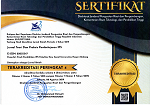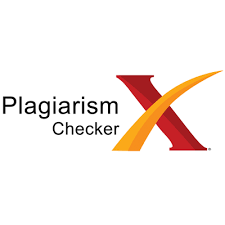Integrasi nilai karakter lokal dalam pengembangan bahan ajar IPS untuk meningkatkan wawasan kebangsaan siswa
Abstract
Knowledge and cognitive development of individuals come from socio-cultural sources that are around themselves. This article is intended to examine the use of local character values in the development of social studies teaching materials in schools. The method used is the 4-D model Thiagarajan, which has a soft, (1) Determine, (2) Design, (3) Develop, and (4) Disseminate. From the research process, a significant difference is presented between learning before using character values and after using local characters. This is discussed by the difference in the pre-test and post-test values after there is a use of character values in the social studies learning process, the t-count value indicates the value is higher than the t-table value, 1.7> 1.685 for 5%. The n-gain pre-test and post-test values were 0.58 in the medium category. These values indicate the value of local characters has a significant increase in improving student learning outcomes. From the results of this test, it is recommended for experimental research with explanatory designs to illustrate the consistency of local characters in the knowledge of students on the subject of a nationalism insight.
Keywords
Full Text:
PDFReferences
Ayatrohaedi, Edt. (1986). Kepribadian Budaya Bangsa (Local Genius). Jakarta: Pustaka Jaya.
Azlina, N., Mokmin, M., & Masood, M. (2015). The Development of Self-Expressive Learning Material for Algebra Learning : An Inductive Learning Strategy. Procedia - Social and Behavioral Sciences, 197 (February), 1847–1852. https://doi.org/10.1016/j.sbspro.2015.07.245
Eddy Sutadji et al. (2015) ‘Kefektifan Pembelajaran Bermakna melalui Lesson Study di Sekolah Dasar | Sutadji | Jurnal Pendidikan dan Pembelajaran (JPP)’, JURNAL PENDIDIKAN DAN PEMBELAJARAN (JPP), 22(1). Available at: http://journal.um.ac.id/index.php/pendidikan-dan-pembelajaran/article/view/7717 (Accessed: 30 April 2020).
Faslah, R. (2011) ‘Pemanfaatan Internet Dalam Pengembangan Konsep Ips Dan Implikasinya Terhadap Pembelajaran Bermakna’, Econosains Jurnal Online Ekonomi dan Pendidikan, 9(2), pp. 167–170. doi: 10.21009/econosains.0092.07.
Gogoi, S. (2015). Importance’s of teaching learning materials for young children * Dr . Sampreety Gogoi. International Journal of Current Research, 7(09), 20269–20273.
Purnomo, A. and Purwasih, J. H. G. (2019) ‘Build Student Knowledge about Natural Resources and Hazard Potential Through Field Social Studies Laboratory Product’, in. Atlantis Press. doi: 10.2991/icskse-18.2019.36.
Ratnawati, N. et al. (2017) ‘Pengembangan Buku Pedoman Lab Alam Fakultas Ilmu Sosial Untuk Siswa SMP’, Jurnal Teori dan Praksis Pembelajaran IPS. State University of Malang
Samuel, A. W. (2009). The importance of instructional materials in our schools. New Era Research Journal of Human, Educational and Sustainable Development, 2(January), 61–63.
Sanjaya, Wina. (2005). Pembelajaran dalam Implementasi Kurikulum Berbasis Kompetensi. Jakarta: Kencana Prenada Media Grup.
Sardiman, A. M. (2007). Interaksi dan Motivasi Belajar Mengajar. Bandung: Rajawali Pers.
Sibarani, Robert. (2012). Kearifan Lokal: Hakikat, Peran, dan Metode Tradisi Lisan. Jakarta: Asosiasi Tradisi Lisan (ATL).
Smaldino, E Sharon, dkk, (2011). Teknologi Pembelajaran dan Media untuk Belajar, diterjemahkan oleh arif rahman dari Istrukturional Technology And Media For Learning. Jakarta: Kencana Prenada Media Grup.
Suparno, Paul (1997). Filsafat Konstruktivisme dalam Pendidikan. Yogyakarta: Kanisius.
Susanto, Ahmad. (2014). Teori Belajar dan Pembelajaran di Sekolah Dasar. Jakarta: Kencana Prenada Media Group.
Trianto. (2012). Model-model Pembelajaran Inovatif-Progresif. Jakarta : Kencana Prenada Media Grup.
Van den Ham, A. K., & Heinze, A. (2018). Does the textbook matter? Longitudinal effects of textbook choice on primary school students’ achievement in mathematics. Studies in Educational Evaluation, 59 (April), 133–140. https://doi.org/10.1016/j.stueduc.2018.07.005
Refbacks
- There are currently no refbacks.
Editorial and Administration Office:
This Journal is published by Prodi Pendidikan IPS, Fakultas Ilmu Sosial, Universitas Negeri Malang
Semarang St. No. 5 Building I3-102 65145.
Phone. (0341) 551312. line. 376 (19)
Homepage: http://journal2.um.ac.id/index.php/jtppips/index
email: jtp2ips.journal@um.ac.id
JTP2IPS INDEXED BY:
e-ISSN 2503-5347
ISSN 2503-1201
JTP2IPS is licensed by CC BY 4.0.










